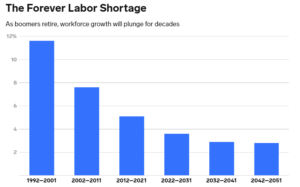What makes a candidate “qualified”?
Their education? How about life experience? Training on the job or other certifications? Some combination of all these categories?
Traditionally, a four-year degree was considered a ticket to employment. Although the essential duties of their jobs had not changed, many employers began adding degree requirements to descriptions beginning in the early 2000s (Harvard Business Review). But does a degree today have the same impact on a candidate’s application?
The “Forever Labor Shortage”

From Insider, this graph depicts projected job growth slowing in the coming decades.
The United States is currently in a tight labor market. With the retirement of baby boomers, there are simply not enough workers to fill all available job openings. On average, baby boomers had fewer children than their parents before them. Immigration, which would have otherwise supplemented the workforce, came to a halt during the pandemic, and has not yet returned to previous levels. The most recent national labor data show that unemployment has decreased to its lowest since 1969, indicating there literally are fewer people available to hire.
What is the best way, then, for employers to recruit during a labor shortage?
The debate over degrees

Photo from UK Black Tech on Unsplash
One way to broaden the candidate pool is to relax degree requirements. Is a degree absolutely required to carry out the duties of the position? Can certain qualities be developed on the job instead? Depending on the role, there may be technical or program certifications that can be used in lieu of a bachelor’s degree.
Furthermore, by requiring a degree, are there certain groups of untapped talent that may be excluded? Skills learned outside of a formal education can still be beneficial in the workplace.
Angela Briggs-Paige, Head of People & Culture at Opportunity@Work, refers to such individuals as “STARs” – Skilled Through Alternative Routes. In an interview with SHRM, she says:
[Employers] often overestimate the percentage of the workforce who hold degrees. This misperception, coupled with the notion that low-wage means low-skilled and that no degree means no skill, can inhibit mobility for millions of workers without degrees.
If the degree requirement is removed from a job description, what should replace it? Employers can use assessments during the recruitment process to determine candidates’ critical thinking, problem-solving, and creative abilities. In most situations, someone’s leadership potential and willingness to learn outweigh the immediate benefits of having a degree.
In a practical context, based on a study from Harvard Business Review of 50 million job postings, employers who adjusted the degree requirement were instead listing more details for the soft skills desired in each of those roles. By thinking more critically about the characteristics that will make someone successful in the job, hiring managers can better identify the individuals whose skillsets align.
The increase in skills-based hiring

Photo by Edmond Dantes on Pexels
Skills-based hiring identifies the competencies needed in a role, over (you guessed it) a degree. The first step in transitioning to a more skills-based approach involves a mindset shift: screening candidates in instead of screening candidates out. This is where it is beneficial to enlist the help of a recruiting or talent partner, who can guide hiring managers in reviewing candidate qualifications. As a result, searching by skills can increase the diversity of the candidate pool, creating possibilities for individuals who previously would have been screened out due to educational requirements.
In the corporate world, many large companies such as IBM and Kellogg have shifted to skills-based hiring practices. Moreover, the states of Alaska, Pennsylvania, Utah, and Maryland have removed the college degree requirement for many government positions. SHRM reports:
- 20% of job listings on LinkedIn no longer require a four-year degree
- Recruiters are 50% more likely to search by skills than years of experience
- LinkedIn searches filtering for skills has grown 25% since 2019
Reflecting on your most critical recruitments, have you observed an overall shift towards screening and hiring for skills? What additional insights would you benefit from when it comes to the ongoing labor shortage and recruiting practices? Think of Another Source as your dedicated recruitment partner – we look forward to connecting with you here or over your favorite social media.
Written by Evelyn Kwong 2023


